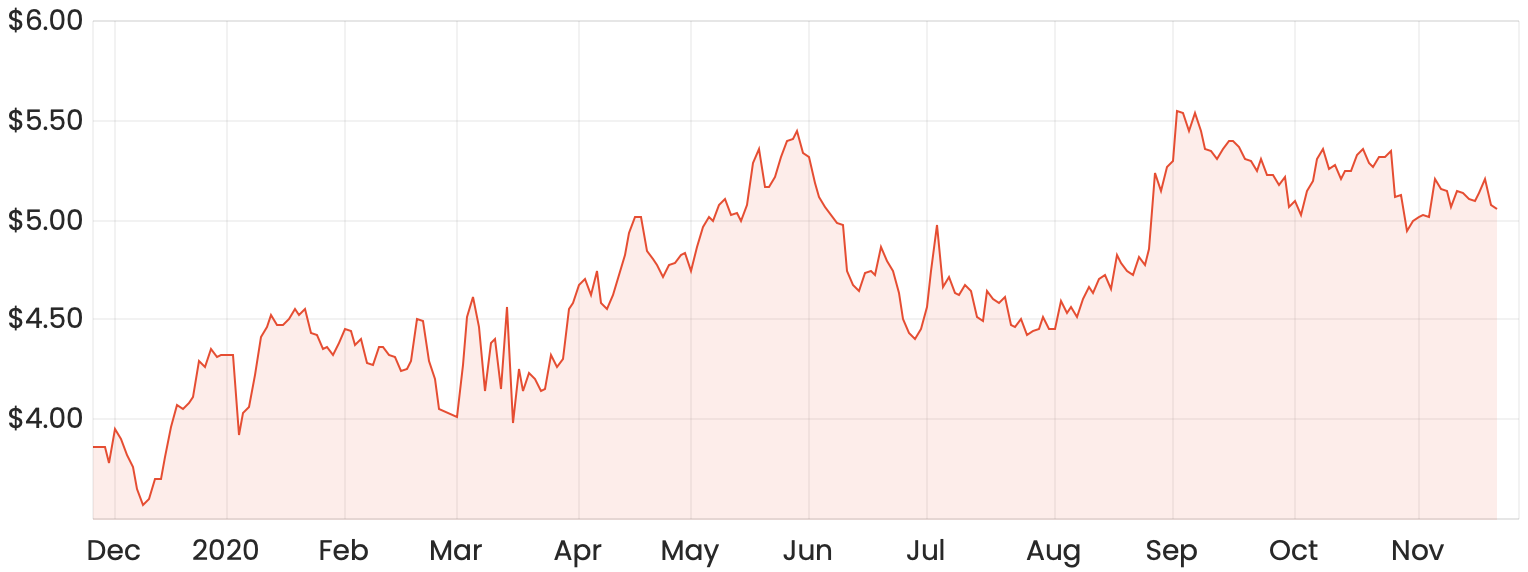The Bega Cheese Ltd (ASX: BGA) share price is soaring today following news the Aussie dairy company will acquire Lion Dairy & Drink.
Yesterday, Bega revealed it has entered a binding agreement to purchase Lion Dairy & Drink in a $534 million deal from Japanese company Kirin.
Last year, Lion was intended to be sold to Chinese company Mengniu Dairy, however, the deal was terminated by the Australian government on national interest grounds.
This deal could potentially rub some salt in the wound, creating some further tension on an already strained relationship between Australia and China.
Bega will fund the deal through a combination of new and extended debt facilities, along with the proceeds from a $401 million capital raising. The raising will be undertaken at an offer price of $4.60, which represents a 9% discount to Bega’s last traded price of $5.06.
BGA share price

What does Bega do?
It’s a brand many Australians would be extremely familiar with. Bega is involved in receiving, processing, manufacturing and distributing dairy products in Australia.
Bega has a long and rich history in Australia and is well known for its variety of cheeses, peanut butter, vegemite and other dairy products.
Bega has been around since 1890 and originally commenced as a dairy cooperative. The company made a series of acquisitions over the years and officially became a company in 2008 and listed on the ASX in 2011.
Lion Dairy acquisition
The Lion acquisition will complement Bega’s existing offering with the addition of other well-known dairy brands such as Dare, Vitasoy, Yoplait, Dairy Farmers, and more. Management has indicated the deal has significant synergy potential of around $41 million per annum in cost savings.
This acquisition appears to make a lot of sense and has the attractive features of both vertical and horizontal integration.
It’s horizontal in the fact that Bega has essentially eliminated a direct competitor that sells similar products. Bega now has the opportunity to strengthen its core dairy footprint and expand its branded portfolio of products. The addition of juice products from Lion (through brands such as Berri, Mildura and Just Juice) adds some diversification away from milk-based products, which can be cyclical based on supply constraints.
The vertical integration, however, is where the significant cost savings will be driven from. Back office corporate functions will be integrated and optimised, and even more synergies will arise from enhancing its supply chain functions and manufacturing capacities.
Dairy industry basics
Neither Bega nor Lion own any actual dairies. Instead, they engage with various suppliers (farmers) across Australia to purchase milk, which is then turned into various products.
Something I’ve recently learned about the dairy industry is that it’s largely unregulated by the Australian government. Since deregulation in 2000-01, the government has had no legislative control over the price that milk processing companies pay farmers for milk.
I see this as a huge tailwind (if it remains unregulated), but what’s even better is that this Lion acquisition will result in fewer different buyers in the market for milk who would typically compete with each other for the best price. This should result in cheaper raw materials, which bodes well for Bega’s bottom line.
Potential headwinds
Companies such as Bega are ultimately at the mercy of their input costs (milk prices). The sideways share price movement over the last few years has largely been the result of widespread drought across the country. A lower supply means that buyers must compete for volume, which drives up the price.
While this has been a headwind in the past, the milk supply situation is starting to improve, which is reflected in the price of milk.
According to the Department of Agriculture, Water, and Environment, the cost of farmgate milk in Australia is forecast to average 47.9 cents per litre in 2020-21, which is 9% down from high levels in 2019-20.
This is partly due to drought conditions easing, however, it’s mostly the result of COVID-19 disruptions, which affected our export market by reducing consumer spending levels and lowering consumer confidence in many overseas economies.
Around 65% of Bega’s revenues are generated domestically. Admittedly, there is quite a bit of international exposure, but with over 40 different export countries, it doesn’t seem too concentrated on one particular area or country.
Time to buy?
Usually, you’d want to try and pick up shares in cyclical companies when they’re looking the most beat up. Your buying decision would therefore be based on your interpretation of where you think the company currently is in its cycle.
My own view would be that Bega is coming out of the bottom of its cycle given the recent improvement in seasonal conditions that will provide a nice tailwind for milk production.
I’ve looked past the valuation aspect for this one as I like the qualitative story of the company and this major acquisition.










